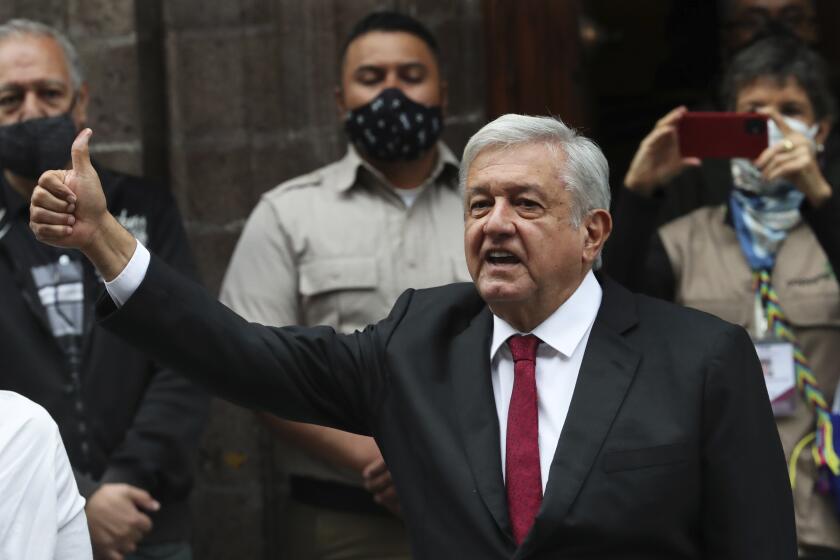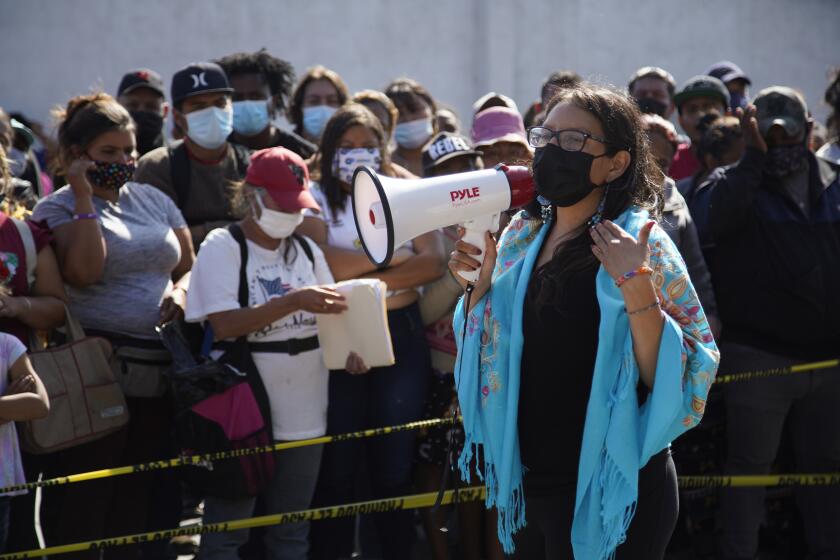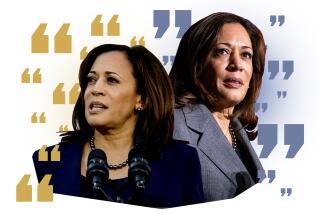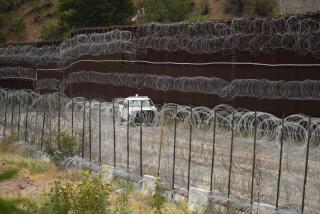In Guatemala, Harris tells would-be migrants to U.S., ‘You will be turned back’

Harris speaks after meeting on migration with Guatemalan president on her first foreign trip as vice president. Next she heads to Mexico.
- Share via
GUATEMALA CITY — Speaking from Guatemala’s capital with its president at her side, Vice President Kamala Harris delivered a stark message Monday to would-be migrants from Central America, saying they “will be turned back” if they attempt to cross the U.S. border illegally.
Harris, on her first foreign trip as vice president, also gently chided her host, Guatemalan President Alejandro Giammattei. He and other regional leaders, she said, must work to reduce poverty, violence and corruption and give their citizens reasons to stay in their home countries — to create “hope” for citizens about their futures there.
“I believe if you come to our border, you will be turned back,” Harris said during a joint news conference with Giammattei. “So let’s discourage our friends or neighbors or family members from embarking on what is otherwise an extremely dangerous journey.”
Harris was to continue to Mexico City later Monday for the second stop on a two-stop, two-day trip. She is to meet on Tuesday with President Andrés Manuel López Obrador, a left-wing populist who developed a collegial relationship with the Trump administration.
Mexican President Andrés Manuel López Obrador’s party and allies appear poised to maintain their majority in the lower chamber of Mexico’s Congress.
Harris, in remarks to reporters before her meeting with Giammattei, said her visit here underscored the priority that President Biden placed on the region. “It is important that as we embark on a new era that we recognize the significance and the importance of this relationship,” she said.
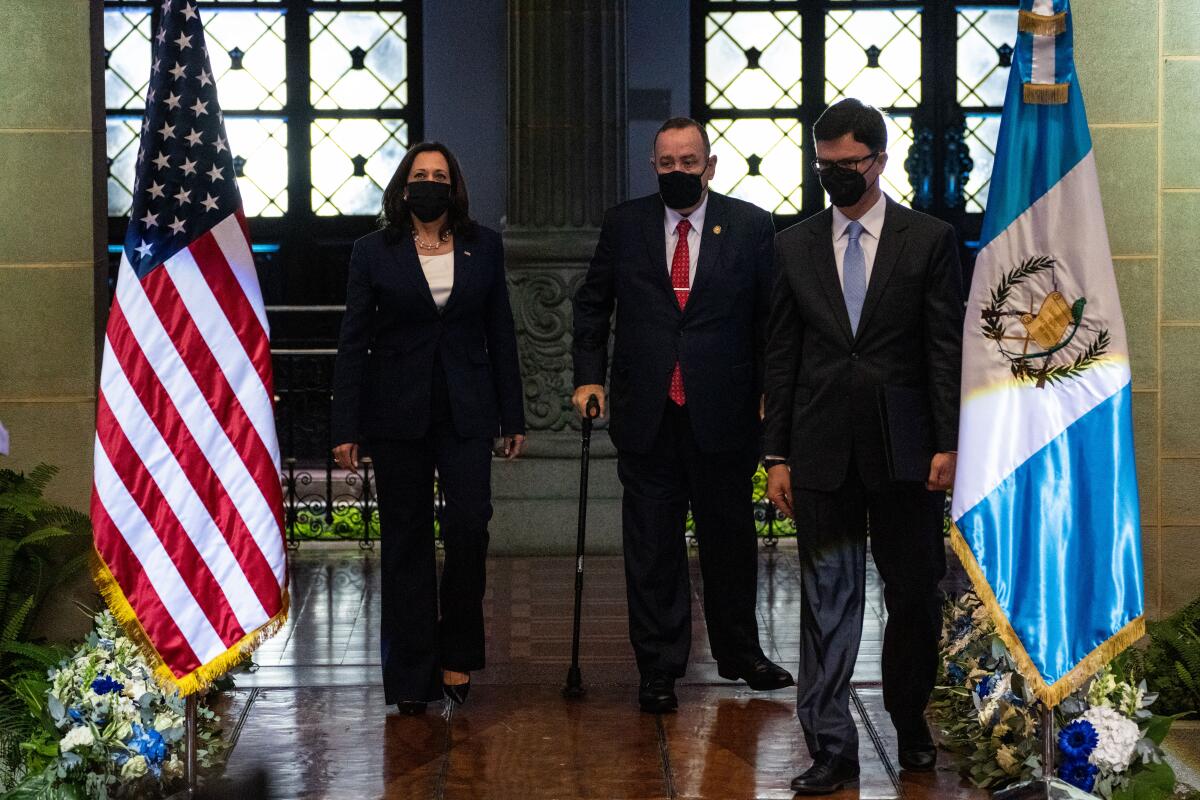
Giammattei, at the news conference, said Harris’ visit provided an “opportunity to be able to work on a joint agenda” to help the Guatemalan economy. But he also seemed defensive at Harris’ remarks on corruption, bristling at the implicit criticism of his government.
He said the two discussed opening U.S. markets and expanding the availability of work visas — “a very simple process to allow people to migrate regularly to the United States.”
“We can move forward mile after mile until we can turn this country into a country of opportunity where people want to stay,” Giammattei said.
Harris, in what she called a “robust, candid” and thorough discussion, said she and Giammattei discussed “the fundamental belief that most people don’t want to leave home.”
She said they agreed that illicit drugs and human trafficking are undermining security in both Guatemala and the United States. To improve conditions, she said the United States would start an initiative to empower young women, provide investment in agribusiness, housing and start-up businesses and encourage corporate executives globally to invest.
Significantly, given the role of corruption in the region’s plight, Harris said, “The president and I discussed the importance of anti-corruption and the importance of an independent judiciary.” She said a task force will be set up to train people and support local prosecutors, adding, “Corruption does not know borders, and we want to make sure that this is about transnational crime... Follow the money.”
Later, Harris sought to emphasize what she has described as a pillar of the new Biden administration policy: To work more closely with nongovernmental organizations and activist groups, channeling aid money away from corrupt politicians.
Officials have quietly deployed a mobile app relying on facial recognition technology to collect data on asylum seekers before they cross the border.
She met with a large group of leaders in Guatemala’s civil society, including well known activists Rigoberta Menchú, a Nobel Peace laureate and veteran campaigner for indigenous rights; former Vice President Eduardo Stein, who has long worked on behalf of migrants and refugees; and Helen Mack, a prominent human rights defender whose anthropologist sister was assassinated by the Guatemalan military three decades ago.
Harris had landed in Guatemala City on Sunday evening to a red-carpet reception and was greeted by a national honor guard under a slight breeze. This first trip outside the United States since taking office is one with historic significance. Harris is now the highest-ranking woman of color in the history of the United States to represent the country on foreign soil.
She is doing so in her role as Biden’s emissary to address the root causes of Central Americans’ migration northward. Ahead of Harris’ trip, administration officials tried to lower expectations about any immediate results, stressing that this visit was her introduction to the region.
But she is under political pressure to show results. Republicans have tried to tie her to the administration’s struggles to manage the border and have attacked her for not acting more aggressively in her assignment. And the continued flow of migrant families and unaccompanied children to the U.S. border has created an urgent humanitarian problem.
Ricardo Zúñiga, the administration’s special envoy to the region, defended the decision for Harris to meet with Giammattei, despite attacks here on independent bodies trying to root out corruption in the government.
Zúñiga told reporters Sunday night that Harris and Giammattei would talk “clearly and plainly as partners, as countries that have to get along.” In previous conversations with leaders in the region, Zúñiga said, “we talked about the easy things, but we talk mostly about hard things.”
Specialists on the region looked to Harris’ diplomacy for further signs of the shift from the policies of President Trump.
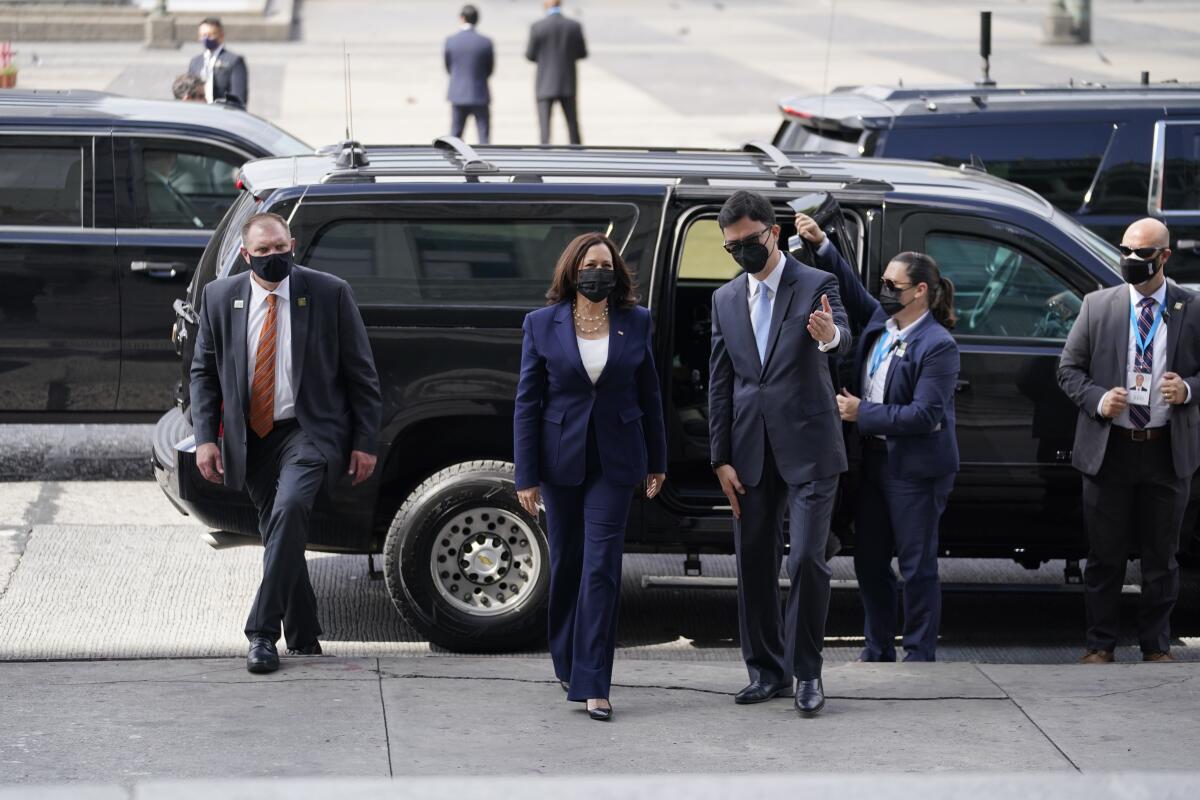
“This is a trip to Mexico and Guatemala, but it’s a trip that’s being viewed across the broader region as ... an indication of what is going to be the Biden administration’s broader strategy,” said Jason Marczak, director of the Adrienne Arsht Latin America Center at the Atlantic Council think tank, which held a discussion on the trip Friday.
Biden asked Harris in March to tackle what the administration called the root causes that had led to an increased number of people from Guatemala, Honduras and El Salvador, including many families and unaccompanied children, to head toward the United States.
The three countries, known collectively as the Northern Triangle, have been rocked by recent hurricanes and the COVID-19 pandemic. But they also have deeply embedded poverty and corruption that have allowed drug cartels and other criminals to thrive. Harris is not traveling to Honduras or El Salvador and has not met with either country’s leaders because of American concerns about corruption in both countries.
Harris has spent months meeting with experts, activists and business leaders, often virtually, and has begun implementing a strategy that includes soliciting foreign investment as well as granting foreign aid, while exerting pressure on the governments to improve their governance and human rights records.
Corruption is “kind of a driver of migration” because “when the governments are not reliable, they can’t deliver services,” said Steve Johnson, a top advisor on the region in the George W. Bush administration.
But Ana Maria Mendez, Oxfam’s Central America director who is based here, said in an interview, “We should all be clear that one visit will not solve it all.”
Harris has also emphasized the need for patience. Many of the problems have been festering for decades. Biden had a nearly identical assignment in 2014 when he served as vice president in the Obama administration but was unable to make a long-term impact.
The vice president’s trip got off to a rough start as she left Washington on Sunday afternoon. Harris’ plane was turned back after takeoff because of mechanical problems, forcing her and those traveling with her to switch aircraft.
“We all said a little prayer, but we’re good,” she told reporters as she walked off the troubled plane.
Bierman reported from Guatemala City and Wilkinson from Washington.
More to Read
Get the L.A. Times Politics newsletter
Deeply reported insights into legislation, politics and policy from Sacramento, Washington and beyond. In your inbox three times per week.
You may occasionally receive promotional content from the Los Angeles Times.
